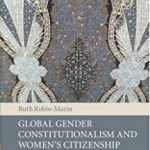Larissa Cristina Margarido (2023)
One of the most interesting – albeit challenging – parts of researching child marriage in Brazil is recognizing the need for a more nuanced, dynamic, and critical understanding of children’s agency. Unfortunately, we are still quite distant from it by PhD candidate Larissa Cristina Margarido, FGV Sao Paulo Law School How are sexual and family practices […]
Victoria Shmidt (2023)
BLOG: There has been a shift in many post-Soviet countries’ efforts to improve the protection of children’s rights in child protection, resulting in fewer children in residential care. However, there are still challenges for ensuring the sustainable implementation of children’s rights. Blog post by Postdoc Victoria Shmidt, UNIVERSITY OF GRAZ Child protection in the fifteen […]
Ana Côrtes (2023)
de Mello Côrtes, A. Ruth Rubio-Marín, Global Gender Constitutionalism and Women's Citizenship: A Struggle for Transformative Inclusion. Jindal Global Law Review (2023)
Guest researcher at LawTransform Ana Côrtes has written a book review on Global Gender Constitutionalism and Women’s Citizenship: A Struggle for Transformative Inclusion, which has been published in the Jindal Global Law Review. The book is written by Ruth Rubio-Marín and addresses the history of constitutionalism with women as the point of reference. Rubio-Márin launched the book at last years Bergen Exchanges […]
BLOG: Fulfilling children´s right to participate and be involved in complex settings such as hospital treatment, child protection, court proceedings, is difficult to realize. However, in the health sector the support of a psychosocial professional is a promising solution to securing children’s rights that may be considered within in other sectors. Blog post by Amarens […]
Last week the Norwegian government published a rapport outlining measures that can be used to reconcile the Norwegian state and the Sami, Kven and Norwegian Finns. These indigenous and minority groups were over several decades victim to human rights violations through an assimilation policy known as Norwegianisation. Senior researcher at Chr. Michelsen Institute, Elin Skaar […]
LawTransform co-director Liv Tønnessen and other LawTransform affiliates and PhD course alums have contributed with chapters in the newly published Research Handbook on International Abortion Law edited by Mary Ziegler, Martin Luther King Jr. Professor of Law, University of California, Davis School of Law, US. The book provides an in-depth, multidisciplinary study of abortion law […]
Mathea Loen and Marit Skivenes (2023)
Loen, Mathea and Marit Skivenes. 2023. Legitimate child protection interventions and the dimension of confidence: A comparative analysis of populations views in six European countries. Journal of Social Policy: 1–20. doi:10.1017/S004727942300003X, .
The child protection system and social services are a part of legitimate state institutions which are crucial to democratic governance, stability, and the sustainability of the welfare state. As legitimacy is often closely linked to the notion of trust and confidence, this study investigates public confidence in the child protection system by comparing six European […]
Liv Tønnessen and Samia Al-Nagar (2023)
Tønnessen, L., & Al-Nagar, S. (2023). Women, Revolution, and Backlash: Igniting Feminist Mobilization in Sudan. Politics & Gender, 1-6. doi:10.1017/S1743923X22000708
Women were at the forefront of the popular uprising that overthrew Sudan’s dictator, Omar al-Bashir, in 2019 (Al-Nagar and Tønnessen 2021). In the aftermath of the uprising, different forms of feminist mobilization emerged. Based on interviews conducted in Sudan in early 2022, we argue that this feminist mobilization was sparked by the backlash facing women […]
New book chapter by Marta Rodriguez de Assis Machado, Denise Vitale and Danielle Hanna Rached in Feminist Frontiers in Climate Justice: Gender Equality, Climate Change and Rights, published at Elgar Online. The chapter can be accessed here. Photo: Elgar Online
Angela Lindt (2023)
Transcript publishing house
Peru’s industrial mining sector is highly conflictual and characterized by social disputes. Many of these conflicts are fought not only in politics but also in the courts, as activists attempt to hold corporate and state actors liable for human rights violations. At the same time, they face an increasing criminalization of their protests. Law is […]
 Do young wives have agency?
Do young wives have agency?





